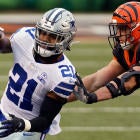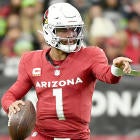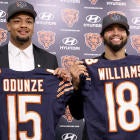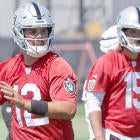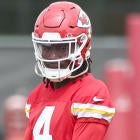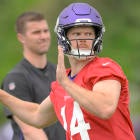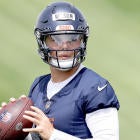
Running back salaries had been steadily declining before hitting a low point in 2017 when there weren't any left on multi-year contracts averaging $10 million per year or more. The highest-paid running back was Devonta Freeman with a five-year contract extension averaging $8.25 million per year he received from the Atlanta Falcons that preseason. In 2012, Freeman would have been the NFL's seventh-highest paid running back by average yearly salary.
A reversal started occurring in 2018. The Rams signed Todd Gurley to a four-year, $57.5 million extension (worth a maximum of $60 million through salary escalators) with two years remaining on his rookie contract. At $14.375 million per year, Gurley's deal represented an almost 75% increase over Freeman's extension.
The Rams released Gurley in March following a lackluster 2019 campaign in which he rushed for a career-low 857 yards. Gurley didn't play any of his new contract years since his four-year extension ran from 2020 through 2023. The 2017 NFL Offensive Player of the Year made out like a bandit from the deal. Gurley is $20 million better off from the extension than playing out his rookie contract. He quickly signed a one-year deal for $5.5 million (worth up to $6 million through incentives) with the Falcons.
Gurley didn't serve as a cautionary tale dissuading other teams from investing heavily in a running back. Even with Gurley getting released, the number of high-priced running backs doubled from four at the end of the 2019 season to eight when this season started.
Some believe there is a better way to allocate financial resources than paying a running back in a salary cap system. Here's a look at whether the high-priced running backs have been worth the money this season.
Good return on investment
The Tennessee Titans designated Henry as a franchise player for $10.278 million in March after a 2019 season where he led the NFL in rushing (1,540 yards) and tied for the league's most rushing touchdowns with 16 despite missing a game late in the season because of a hamstring injury.
Henry really made his mark in the playoffs during the Titans' run to the AFC Championship Game. He became the first player to ever have two games of at least 180 rushing yards in the same postseason. Henry also set an NFL record for the most rushing yards during a playoff run (not including the Super Bowl) with 446. His 148.7 rushing yards per game during the playoffs is the fourth-best mark ever in any single postseason.
The Titans signed Henry to a four-year, $50 million contract (with an additional $1 million in incentives) right before the July 15 long-term deal deadline for franchise players. The first two years worth $25.5 million are fully guaranteed.
Henry has picked up where he left off during the playoffs this season. He is on the verge of winning his second straight rushing title. Henry has a career-best 1,777 rushing yards. He also has the third-most rushing touchdowns with 15. Henry is the first player with back-to-back 1,500 rushing yard seasons since Larry Johnson accomplished the feat in 2006.
More importantly, the Titans have the inside track for the AFC South crown with a 10-5 record. A win against the Houston Texans or an Indianapolis Colts loss in the season finale will secure the division title.
Cook signed a five-year, $63 million extension (worth a maximum of $70 million through salary escalators) with $28,131,361 of guarantees a day before the regular season started. He is having one of the finest seasons for a running back in Minnesota Vikings franchise history. Cook leads the NFL with 1,918 yards from scrimmage (combined rushing and receiving yards). He is tied for the lead with 16 rushing touchdowns. Cook has the second-most rushing yards (1,557) and is tied for second in total touchdowns (17). All of these marks are career highs. His production hasn't translated into team success though -- the Vikings are 6-9 this season. The last time the Vikings had a losing record was in 2014.
The New Orleans Saints signed Kamara to a five-year, $75 million extension with $34,333,333 in guarantees right before the regular season started. The $15 million per year average is misleading because he has no chance of seeing the $25 million in his 2025 contract year. The deal averages $12.5 million per year through 2024, the first four new years.
Kamara has bounced back from a 2019 season in which he was slowed by knee and ankle problems. He was the leading candidate for NFL Offensive Player of the Year when quarterback Drew Brees was lost for four games with broken ribs and a collapsed lung in a Week 10 contest against the San Francisco 49ers. Kamara was practically on pace to break both the NFL single-season receptions and receiving yards records for a running back until Brees got hurt. Any chance at the records went out the window because Kamara was underutilized in the passing game with Taysom Hill in the lineup instead of Brees.
Nonetheless, Kamara is still a strong candidate for the award despite the lull in production with Hill. Kamara is leading the NFL with 21 touchdowns. He just tied an NFL single-game record with six rushing touchdowns against the Vikings in a Christmas Day contest. Kamara has the third-most yards from scrimmage with 1,688 yards. He is also 68 yards away from his first 1,000-rushing-yard season.
The Saints have clinched the NFC South title. If the playoffs started today, the Saints would have the number two seed in the NFC.
Not paying dividends
McCaffrey reset the running back market after becoming the third player to ever have at least 1,000 rushing yards and 1,000 or more receiving yards during the same season in 2019. He signed a four-year extension averaging $16,015,853 per year with $39,162,500 of guarantees in April. McCaffrey has a running-back-best $30,062,500 fully guaranteed at signing.
2020 has been a lost season for McCaffrey. He has been limited to three games because of ankle, shoulder and thigh injuries. Durability had never been an issue with McCaffrey before this season. He had been an ironman. During the previous two seasons, McCaffrey was on the field for 92.4% of Carolina's offensive snaps (2,005 of 2,171 plays).
McCaffrey is a prime example of why a running back should strike contractually while the iron is hot. Had he played this season on the fourth year of his five-year rookie contract, he would have been hard pressed to reset the running back market during the upcoming offseason. Most likely, he would have been looking at a long-term deal in the same neighborhood as Cook, Henry and Kamara. There's also a chance the Carolina Panthers would have been reluctant to do a lucrative extension after the injuries, especially with general manager Marty Hurney's recent departure.
Elliott has been trending in the wrong direction statistically since becoming the first running back in league history to sign a $100 million contract. The two-time rushing champion signed a six-year, $90 million extension, which made him the NFL's highest-paid running back ahead of Gurley, shortly before the start of the 2019 regular season to end a lengthy preseason holdout. Elliott, who had two years remaining on his rookie contact, established new standards for running backs with $50,052,137 in overall guarantees and $28,052,137 fully guaranteed at signing with the deal.
The three-time Pro Bowler averaged 84.8 yards per game on the ground in 2019. Prior to that, Elliott had averaged 101.2 rushing yards per game for his career. This season, Elliott is averaging a career-low 66.9 rushing yards per game behind an offensive line depleted by injury. He will hit the 1,000-rushing-yard mark for the fourth time in his five NFL seasons with 63 yards against the New York Giants in the season finale.
The Dallas Cowboys are caught between a rock and a hard place with Elliott, especially if there is an internal belief he is going to be a case of diminishing returns because of how his contract is structured. Elliott's $9.6 million 2021 base salary was fully guaranteed on the fifth day of the 2020 league year. His $12.4 million 2022 base salary guarantee, which is guaranteed for injury, will be fully guaranteed on the fifth day of the 2021 league year (March 21).
Elliott can't be released in a conventional manner before the 2022 salary guarantee kicks in March 21 because $10.8 million of bonus proration from his 2022 through 2024 contract years would hit Dallas' 2021 salary cap. This would result in $24.5 million of dead money -- a salary cap charge for a player no longer on a team's roster -- when Elliott's 2021 cap number is $13.7 million.
Letting the 2022 salary guarantee vest would likely tie the Cowboys to Elliott until 2023 absent a trade or releasing him with a post-June 1 designation before next March 21, which would prevent the bonus proration in the future contract years from accelerating to 2021. Dallas would have $13.7 million in dead money next year and $10.8 million in 2022 with a post-June 1 designation. The 2021 dead money would get reduced by Elliott's next contract because his salary guarantees have an offset. Trading Elliott during the offseason would create $14.9 million in dead money, but he would be off Dallas' books beginning in 2022.
The New York Jets were essentially bidding against themselves in signing Bell to a four-year, $52.5 million contract (worth up to $60.15 million through incentives and salary escalators) with a then veteran running back contract record $27 million fully guaranteed at signing in 2019 free agency. Bell had his worst season as a pro in 2019.
The Jets pulled the plugged on a disgruntled Bell by releasing him five games into this season. He subsequently signed a one-year contract with the Kansas City Chiefs worth approximately $706,000 in base salary for the rest of the season.
Bell made just over $27 million for his 21-game stay in New York. The Jets have $15,062,500 in dead money for Bell this year. A majority of Bell's dead money comes from his fully guaranteed $8.5 million 2020 base salary. Since there is an offset, the Jets will get some modest cap relief from his Chiefs contract. Bell also had a $4.5 million March roster bonus. Additionally, there's a $2 million cap charge from his $8 million signing bonus. The Jets will have $4 million of dead money for Bell next year because of the signing bonus.
Johnson helped prove Gurley's deal wasn't a market anomaly. Hours before the Arizona Cardinals' 2018 regular-season opener, Johnson signed a three-year, $39 million extension (worth a maximum of $45 million through incentives) with $31,882,500 of guarantees. He fell out of favor with the Cardinals last season after Kenyan Drake was acquired as the late-October trading deadline was approaching.
The Cardinals dealt Johnson, a 2020 second-round pick and a 2021 fourth-round pick to the Houston Texans in March for wide receiver DeAndre Hopkins and a 2020 fourth-round pick. Johnson was expected to be the focal point of the Texans' offense but hasn't resurrected his career. His last highly productive season was in 2016 when he led the NFL with 2,118 yards from scrimmage and 20 touchdowns. Johnson has 885 yards from scrimmage and seven touchdowns this season.
An inability to capitalize on a change of scenery could lead to a short stint for Johnson in Houston. Should the Texans part ways with Johnson in 2021, $9 million of salary cap space would be gained.
Mixon signed a four-year, $48 million extension with $10 million guaranteed in early September. A right foot injury has kept Mixon out of action since the sixth game. Mixon was seventh in the NFL with 428 rushing yards at the time of injury, but only averaging 3.6 yards per carry. He was also eighth in yards from scrimmage (566). Cincinnati is running the ball well during a current two-game winning streak by averaging 160.5 yards per game.
Who's next to get paid
The presumption was the Green Bay Packers selected A.J. Dillon in the second round of this year's NFL draft to replace Aaron Jones, who is in his contract year. Jones said Dillon's presence was going to raise his game. He's done that this season. Jones has posted his second straight 1,000-yard rushing season. He is currently fourth in the NFL with 1,062 rushing yards despite missing two games with a calf strain. Jones leads NFL running backs with 5.6 yards per carry. He also earned his first Pro Bowl berth this year.
Jones has indicated that he would like to remain in Green Bay. He recently switched agents to Drew Rosenhaus. A franchise tag isn't out of the question for Jones. The running back tag will take a steep drop especially if the 2021 salary cap is anywhere near the $175 million floor the NFL and NFLPA set because of league revenues declining due to COVID-19. The running back number projects to $8.3 million with a $175 million salary cap. If the salary cap remains flat at the current $198.2 million level, the running back number would still decline from $10.278 million to a projected $9.4 million.
A long-term deal term might resemble Mixon's because the Cincinnati Bengals and Packers structure veteran contracts similarly. With the exception of quarterback Aaron Rodgers, the only guaranteed money in Green Bay veteran contracts is signing bonus.
Nick Chubb was named to the Pro Bowl for a second straight year, although a sprained MCL in his right knee forced him to miss four games this season. Since entering the NFL in 2018 as a second-round pick, Chubb is third in the NFL with 3,449 rushing yards. He is second among running backs with 5.18 yards per carry (minimum 300 rushing attempts) during this span.
Curiously, Kareem Hunt signed a two-year, $12 million extension (worth a maximum of $13.25 million through salary escalators) containing $8.509 million of guarantees with the Cleveland Browns as the start of regular season approached despite Chubb's presence. He won the NFL rushing title in 2017 with 1,327 yards while a member of the Chiefs as a rookie. Although Hunt has baggage stemming from a physical altercation with a woman that led to his release by Chiefs in 2018 and an eight-game suspension last season under the league's Personal Conduct Policy, he can be used as leverage against Chubb to try keep a second contract below Cook, Henry and Mixon's deals.


























